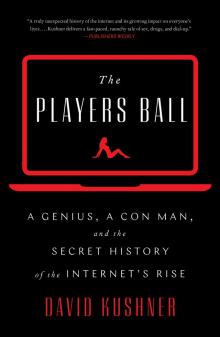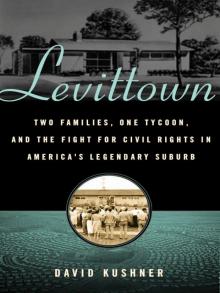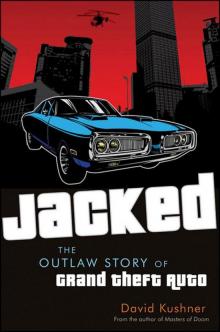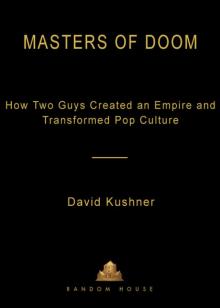- Home
- David Kushner
The Players Ball
The Players Ball Read online
Thank you for downloading this Simon & Schuster ebook.
* * *
Get a FREE ebook when you join our mailing list. Plus, get updates on new releases, deals, recommended reads, and more from Simon & Schuster. Click below to sign up and see terms and conditions.
CLICK HERE TO SIGN UP
Already a subscriber? Provide your email again so we can register this ebook and send you more of what you like to read. You will continue to receive exclusive offers in your inbox.
CONTENTS
Epigraph
1 The World Wild West
2 The Genius
3 The Con Man
4 Matched
5 Screwed
6 The Erotic Technological Impulse
7 The Art of War
8 Rancho
9 The Dogpatch
10 The Crazy Aunt in the Attic
11 The Players Ball
12 Come and Get It
13 Sex, Drugs, and Camarones
14 Happy Birthday
15 The Samurai
16 Across the Border
Author’s Note
About the Author
For Sue, my perfect match
Live in fragments no longer. Only connect, and the beast and the monk, robbed of the isolation that is life to either, will die.
—E. M. Forster, Howards End
KATE (SINGING): The internet is really, really great!
TREKKIE MONSTER: For porn.
—Avenue Q: The Musical
CHAPTER 1
THE WORLD WILD WEST
No one expected things to get so dirty.
It was just a local election, and a seemingly inconsequential one at that, a seat on the Santa Clara Valley Water District Board of Directors. The seven-person board manages the water system and flood control for the 1.9 million residents of the California county, which includes Silicon Valley: patching dams, overseeing water treatment plants, stocking sandbags when creeks overflow, and so on. It’s a noble but unglamorous public service compared to the jetset lives of the tech titans in town. The only residents who usually bother to attend the public meetings are a handful of retirees, and the homeless woman who often sleeps in the back.
But, in 2014, voters were more interested than ever. “Water district elections are usually low-key—if not boring—affairs,” the San Jose Mercury News reported. “Not this year.” The two-man race had become the most vicious, and confounding, in the Santa Clara Valley Water District’s eighty-five-year history. There’d been allegations of corruption, sexual depravity, scandalous lies. For reasons no one could gather, Gary Kremen, a heavyset, disheveled, fifty-one-year-old dot-com multimillionaire, Deadhead, Stanford MBA, and self-described “kook,” shelled out $408,492—largely from his own pocket—to beat incumbent Brian Schmidt, an earnest forty-seven-year-old environmental attorney who’d devoted his career to the cause. “Why is he spending so much?” Schmidt told the Mercury News. “I don’t know what to say.”
The water of Silicon Valley pumped through the heart of Schmidt, who came off like an Eagle Scout. He’d earned his law degree from Stanford, labored locally as an environmental attorney, and blogged about the box turtles he saw while cleaning up the coast. For the past four years, he had proudly served on the Water District board. His fight for the potable reuse of recycled waste water, which could supply half the county’s drinking supply, helped him earn multiple media endorsements. But with only a few days until the election, and his money (and dreams) running out, he finally had enough of Kremen’s Animal House behavior.
One morning in late October, Schmidt bicycled alone to a dried-up pond in the woods near his home in Palo Alto to shoot a last-ditch campaign video for YouTube. Slowly panning his camera across the landscape, he filmed the muddy field limned with dying brown trees. “What you’re seeing around you is the effect of the California drought,” he narrated solemnly. Then Schmidt set the camera in place, and stepped in front of it to tape himself. He was prematurely gray but boyish, and wore a blue “Re-Elect Brian Schmidt” T-shirt. “I am kind of proud to say I am now a target of a negative mailer,” he said.
Schmidt approached the camera and held up the cover of said mailer: a custom greeting card that mocked his recycled waste water plan. “BRIAN SCHMIDT wants to get our drinking water from OUR TOILETS,” the card read.
“It’s a picture of me—next to a toilet,” Schmidt explained. “It claims not to be from my opponent, but you can take that for whatever you want to take it for. This is a very expensive thing, where my opponent has put a lot of money into the race.”
As Schmidt opened the greeting card, it played an audio snippet from one of his stump speeches: “I’m advocating treatment of waste water to drinkable levels.” Then a woman’s voice came on: “Brian Schmidt wants my family to drink water from a toilet? Ewww!” she said. “Say no to toilet water! Say no to Brian Schmidt for Santa Clara Valley Water District.”
As his camera rolled, Schmidt stepped back into focus with the beleaguered expression of a science teacher who’d sat on one too many whoopee cushions. Pedantically, he explained that people were already drinking recycled waste water from Singapore to the International Space Station. “This is astronaut water we’re talking about,” he went on. “It’s healthy enough for them, it’s healthy for the rest of us.” He appealed to the brainiacs in town to give him, and his astronaut water, a chance. “This is Silicon Valley,” he said, as he concluded recording the video he later posted online. “This is a highly educated area. We understand what we can do with technology.”
But few understood technology better than the highly educated man so curiously obsessed with beating him, Gary Kremen. Silicon Valley had seen its share of iconoclastic visionaries—Steve Jobs, Bill Gates, Mark Zuckerberg—but none like Kremen. Though largely unfamiliar to the outside world, he was among the most prescient entrepreneurs in the history of the internet. In business, and in life, true visionaries not only have the foresight to find the next frontier, but the confidence to bet on it. Kremen was legendary among those in the know for his uncanny cocktail of both. As veteran technology investor Ron Posner put it, “He’s very energetic, very creative, very smart—and never gives up.”
Kremen is the father of online dating. In 1993, he founded what was essentially the first—now biggest—dating site, Match.com. Despite about only 5 percent of Americans being online around that time, Kremen brashly told a skeptical TV reporter in 1995 that his invention was going to change the world. “Match.com will bring more love to the planet than anything since Jesus Christ,” the then thirty-one-year-old declared in his nasally toned Chicago accent. The fact that this prediction was coming from some Belushi in a stained tie-dye T-shirt sprawled on a red bean bag made it all the more dubious.
But as Kremen would prove time and time again, his hunch was right. Match.com became an international phenomenon, spreading to more than twenty-five countries in eight languages with more than 42 million members, and becoming the basis of today’s $2 billion online dating industry. The company Kremen started with a $2,500 credit card loan now has a value of $3.5 billion. At a time when most businesspeople barely understood, let alone paid attention to, the internet, Kremen was among the first to figure out how to make money online. Even more radically, he transformed the way people meet and marry in the digital age. As he wrote with characteristic humor on his Water District campaign website bio, “I am responsible for over 1,000,000 babies!”
But according to his detractors, he was responsible for much that was wrong with the internet too. The genius of love was also the sultan of sex, specifically Sex.com, one of the most notorious websites ever online. And it was his epic battle over Sex.com that made him most legendary of all.
It started in the early 1990s, before he pioneered online dating, when Kremen envisioned another new frontier. He thought that domain names—the dot-coms and other addresses that signify ownership online—would one day have the value of real property as people learned how to build businesses on the net. Because domains were deemed worthless at the time, they were essentially free to register. So Kremen gobbled up dozens—Jobs.com, Housing.com, Autos.com, Match.com, and the like—to later monetize. It was the online equivalent of coming to America and staking claims across the country. Though he had no intention of becoming a pornographer, in 1994 he registered Sex.com too, thinking it could become a health and wellness education site.
But while he had been busy with Match.com, someone named Stephen Michael Cohen had somehow stolen the rights to the Sex.com domain—and transformed it into one of the most profitable websites, earning millions of dollars a month. Kremen wanted his site back, and he wanted to get the money Cohen had earned through stealing it. What followed was an epic rivalry that established many of the rules that enable online commerce today. As Kremen’s esteemed lawyer James Wagstaffe said, “This case established the precedent that a domain name is property—property that can be stolen.”
On one side was Kremen. A devoted father of two, he epitomized the entrepreneurial spirit of the new Silicon Valley in his quest to bring love and connection to the world. On the other side was his evil genius twin, Cohen, a stout, balding, forty-eight-year-old convicted felon from Los Angeles. As a con man, Cohen was among the best. He impersonated judges and lawyers, ran swingers clubs, left trails of bad checks, and scammed investors after promising to build a Fantasy Island of sex in the desert outside Las Vegas. A lifelong computer enthusiast, Cohen insisted that, despite Kremen’s claims, he was the real originator of internet dating, and the rightful owner of Sex.com, long before Kremen came on the scene. “He says he invented online sex. That’s the most ridiculous thing,” as Cohen said. “I started the sucking and fucking online! I invented that!” The Los Angeles Times called Cohen “one of the most successful entrepreneurs of the Internet Age.”
The battle of Cohen and Kremen became highly personal, and picaresque. It ran from the boardrooms of Silicon Valley to the bordellos of Mexico. There were porn stars and programmers, billionaires and brainiacs, goons and gangsters. There was even a gunfight on the streets of Tijuana, according to Cohen at least.
But there was more than fame and fortune at stake. The war for Sex.com represents an essential, but overlooked, chapter behind one of the greatest inventions of our time: the internet. In the public imagination, the computer revolution is bookended by two main stories, the rise of Apple and personal computing in the 1980s, and the proliferation of Facebook and social media in the 2000s. But in between those years is a lost era of innovation that’s crucial to understanding the rapidly evolving world of today and tomorrow: the internet gold rush of the 1990s. As in the American Frontier of the 1800s, the early settlers of the net fought to stake their claim and make their millions. They established the systems that defined the world to come. But none of this would have been possible without the fuel that made the internet what it is today, love and sex.
And so in the fall of 2014, it seemed all the more confounding why a mogul with Kremen’s history would be investing so much time and money to win the Water District race. Kremen claimed it was part of his burgeoning interest in sustainability. One of the recent start-ups he founded, a solar energy firm called Clean Power Finance, had received $75 million in investments from Google and others. Brian Schmidt, his beleaguered opponent, suspected there had to be some other reason—he just couldn’t figure it out. “It’s tricky to try to get at somebody’s deeper motivations,” as Schmidt told the Mercury News, “but it is really concerning.”
With every story, there’s a road. Kremen’s led back to the Wild West days of the world wide web, and the fight for the future that left him—and Cohen—reeling to this day. “Believe whatever you want,” as Cohen said late one night not long ago, “I don’t care. I don’t drive a Rolls-Royce anymore. I don’t own airplanes anymore. I don’t have boats anymore. Because none of that shit means anything to me anymore.”
CHAPTER 2
THE GENIUS
Gary Kremen nervously lingered inside his grandfather Manny’s barbershop, ready to bust his move. It was the late 1970s in Lincolnwood, Illinois, a working-class suburb an hour northwest of Chicago near Skokie, but Kremen, a chubby teen with a nest of dark hair, wasn’t here for a trim. Just as his grandfather turned his head for his broom, Kremen slid something under his shirt and sprinted out the door.
Hopping on his bike, he pedaled quickly away through his run-down neighborhood, which had earned the nickname “the Toilet.” He zipped past the baseball team gorging at Lou Malnati’s Pizza, the kids playing putt-putt at the Bunny Hutch Miniature Golf, the solemn commuters on the 210 bus to Chicago. He turned off the main road, as the brick buildings turned to modest homes with dads washing their cars and kids shooting hoops outside, a left here, a right there, until he peeled up the driveway of a pale-pink thousand-square-foot ranch house on a dead-end street by the train track, tossed his bike to the ground, lumbered inside over the mustard-yellow and brown thick shag carpet, past the flowered couches covered in plastic, down the steps into the wood-paneled basement, locking the door behind him, reaching into his shirt, and slipping out his coveted bounty: a Playboy magazine.
But the magazine wasn’t for him, at least not after he was done with it. Kremen was young, but he was in business. And his business was selling the boys of Lincolnwood the hard-to-get stuff they wanted. When they wanted Hubba Bubba, the delectably soft cubes of bubble gum that had recently hit the market and were flying off the shelves, he bought up cases with his lawn mowing and snow shoveling money, then pawned them, piece by piece, to kids at four times the price he paid for them. With his profit, he diversified into baseball cards, dealing to the Cubs fanatics on the schoolyard.
But while candy fads and baseball stars came and went, there was one thing that never went out of style—porn magazines—and those were among the hardest things to get of all. The technology didn’t exist yet to meet the illicit demand. There was no internet, or even cable TV. The only way for kids to get dirty pictures was to steal them, or hand over money to the one guy in town who had the nerve, if not the entrepreneurial ambition, to do it for them, Kremen. It wasn’t just the money that motivated him. It was something deeper, the same thing that drove any successful person: the conviction that a new frontier beyond the Toilet awaited, where his wildest dreams could come true, if only he could find them. But he wasn’t kidding himself. Getting there wouldn’t be easy. He wasn’t handsome or athletic or rich. If he was going to get there, he’d have to do it the only way a young nerd from the suburbs could do it at the time, by using his brains.
Fortunately, brains were a given in the Kremen household. His parents—Norman and Harriett—had used their own to make a comfortable life for Gary and his rebellious younger sister, Julie. And, like Gary, they had risen up by their own bootstraps. Norman, the son of a newspaper distributor and homemaker, had put himself through college, and earned a master’s in education, as had Harriett, the daughter of a barber and manicurist. After meeting on a blind date, his mom taught high school accounting, and his dad, who started teaching driver’s education, worked his way up to becoming an elementary school principal.
Gifted and geeky, they ran their home like their own mental gymnasium, pushing their kids to engineer, explore, and compete. Harriett, a math whiz, encouraged Gary’s interest in math and science, getting him to compete in science fairs and mathlete clubs. Norman, a ham radio hobbyist, nurtured Gary’s interest in engineering. They built their own radio together, and installed a thirty-foot ham radio tower in their backyard. To get his own license, Kremen stayed up all night studying the requisite Morse code.
Gary and his father spent long afternoons in the basement, communicating to other ham operat
ors around the world, putting orange thumbtacks on a map for each country they reached. Kremen marveled at the wonder of the world waiting for him out there, a world he could teach over the airwaves. It felt like a magical extension of their family road trips—when they’d pile into the powder blue station wagon and hit the road to drive to every state but Hawaii. And now he could just go in the basement and connect with people everywhere.
When Kremen was about twelve, in the mid-1970s, they built their own computer and won the science fair. With personal computers not yet on the market, the only way to have such a machine was to cobble one together from a kit. Kremen’s device looked like something from Star Trek, a giant board with throw switches and lights that could add numbers. For a kid who devoured science fiction novels as ravenously as Chicago hot dogs, the computer fired his imagination like nothing else. When his friend showed him a computer running Microsoft BASIC language—a machine that could be programmed by anyone—he had one thought:This is the fucking future.
The computer wasn’t just a taste of the next frontier, it was a means of empowerment—and a way to compete. Kremen joined the nascent computer club at high school, working for hours just to calculate pi to the furthest digit, and try to break the world record. When the group built their own electric motors, Kremen’s was ugly, but functional. It was also, as his friend Mark Zissman observed, the only one that seemed to have been made by a kid without the help of a parent. The better Kremen did in the club against the other kids, the more access he’d get to the machines, and Kremen soon had what was considered “rock star” privileges—with more time and access than anyone. Classmate Neal Gussis recalled that Kremen was the kind of kid whom teachers either loved or hated.
Kremen’s newfound swagger had been manifesting in delinquent ways: smoking pot, lighting fireworks, hopping on trains as they chugged past his cul-de-sac. The computer power didn’t just bolster his ego and bragging rights, it gave him a means for revenge. An anti-Semitic teacher had been coming on to girls, telling them, “Here’s a dime, call me when you’re eighteen.” One afternoon, Kremen struck back, using his access to get on the teacher’s computer. He then secretly typed out a message calling his teacher a “fuckhead”—and had it print out on all the student homework assignments. He got some laughs, and two days out of school suspension.

 The Players Ball
The Players Ball Alligator Candy
Alligator Candy Levittown
Levittown Jacked: The Outlaw Story of Grand Theft Auto
Jacked: The Outlaw Story of Grand Theft Auto Masters of Doom
Masters of Doom